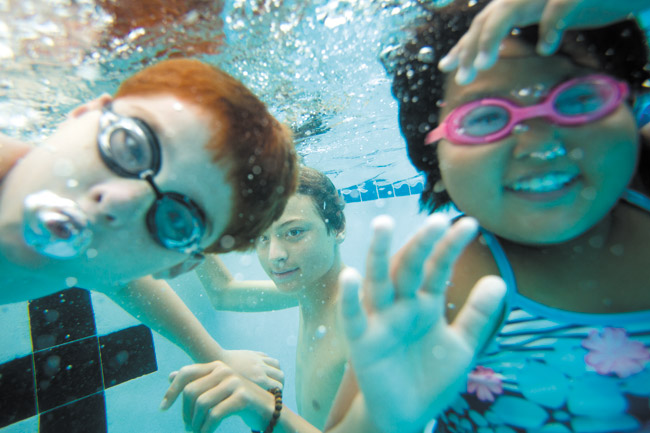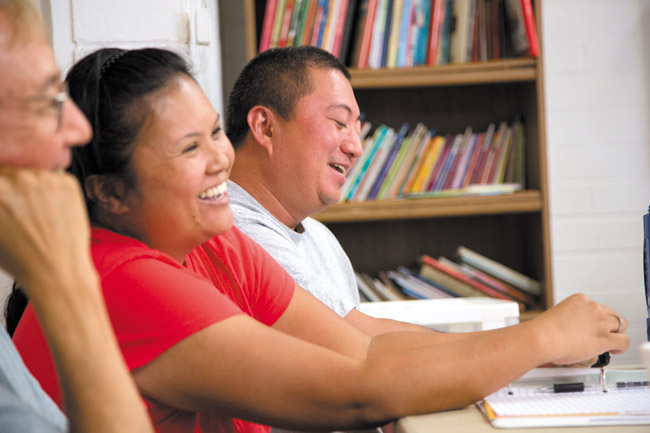New Help For Parents Of Autistic Kids
While parents of children with autism get practical help and make new friends, their keiki enjoy learning to swim and other activities
As Hawaii parents struggle to raise their autistic children, they always can use a little help from their friends. A lot of help would be even better.
mw-nm-081314-autism-1
That’s what they get from the Hawaii Autism Foundation (HAF) Caring for the Caregiver Program, which just completed its second summer session. The 12 weekly meetings at Windward YMCA in Kailua had something fun for the kids (swimming and play), and some very welcome peer bonding for the adults — away from their keiki.
“Thank you so much for the most amazing opportunity to connect with great people and families,” wrote one parent. “We feel fortunate to … receive respite while learning ways to tend our minds, bodies and spirits.”
And outdoors at the Y’s large, heated, saltwater pool last month, it was obvious the kids and their siblings were having the time of their lives with their one-on-one water safety instructors.
Water is very soothing to children diagnosed with autism spectrum disorder (ASD), a confounding, debilitating neurological condition that affects speech, social interaction and a whole list of other behaviors. Swim lessons are a must for them, states National Autism Association, since drowning is a leading cause of death. The youngsters are attracted to water, but may not be able to call for help, for example, or might forget to come up for air.
“I love to see the children become more comfortable in the water,” notes Windward Y branch executive Noa Hussey. “There are always a couple who don’t want to swim, but it’s just so rewarding to watch them adapt over the time period.”
Hussey was at Kaimuki-Waialae YMCA last year, where he put the pilot program together. He couldn’t help it, he admits. His wife and sister are special ed teachers, and a cousin has an autistic child.
So when the pitch came to create a swim/respite course, “I knew we had to try to make this work.”
It did work, and it amassed a long waiting list, partly satisfied this summer in Kailua.
With help from the YMCA, Hawaii Psychological Association and Creative Connections Foundation, HAF funded and trained staff to teach these very special children at their own pace.
Inside, meanwhile, the grownups have their turn, eagerly absorbing all the facilitator of the day has to tell them. They’ve come from as far as Kapolei to join the two-hour Caring course, which still has a waiting list.
That’s why there’s a big push for more sites, more funding and more instructors.
Keep in mind that the Centers for Disease Control and Prevention states that one in 68 American children has ASD, most of them boys. In Hawaii, that equates to about 1,500 of our public school students.
It seems there’s never enough help like this for parents — especially at the bargain price of $50 for the entire course. That’s evident as the adults talk in a circle at a Saturday class; a dozen couples sharing what they are most thankful for on that day.
“I’m grateful for this meeting,” says one parent. “I don’t feel alone.”
“I’m grateful for learning how to make my son sleep,” adds an Ewa Beach mom. “I got seven hours of sleep myself last night — woo-hoo!” (Everyone cheers.)
“I’m grateful for my mother, who loves them all,” says another. “I have five children, and four of them are on the autism spectrum.”
“I’m grateful that I made it through today OK.”
Early childhood educator Vena Ramroop leads this class, and when she introduces herself, they all can relate. “I have Asperger’s (a form of autism), and I’m dyslexic,” she tells them. “So I was the weird kid in school. But nature helps me to stay calm.”
Ramroop then conducts a meditative exercise that puts the parents into the mind of their child, to the extent that it’s more about feelings and visuals than words. Enthusiastically, they draw pictures of the mind trip she’s suggested they take: a tunnel into another place. Later they practice stress-reducing exercises. Other classes have provided techniques for breathing, yoga, the arts, self-care and physical well-being.
“People struggle to hold it all together,” explains Julianne King, co-founder of HAF, which is actively seeking to replicate the Caring program islandwide. “Families need the support — there’s so much to learn. But if you make the right decisions, your child can function better.”
She and husband Don have an autistic son, 14-year-old Beau, and the Kings’ own story is well-documented in their award-winning 2007 film Beautiful Son.
What helps them the most as they continue to raise their child is this:
“You can get depressed, for sure, or consider it the greatest spiritual walk, accept it and find your friends.”







